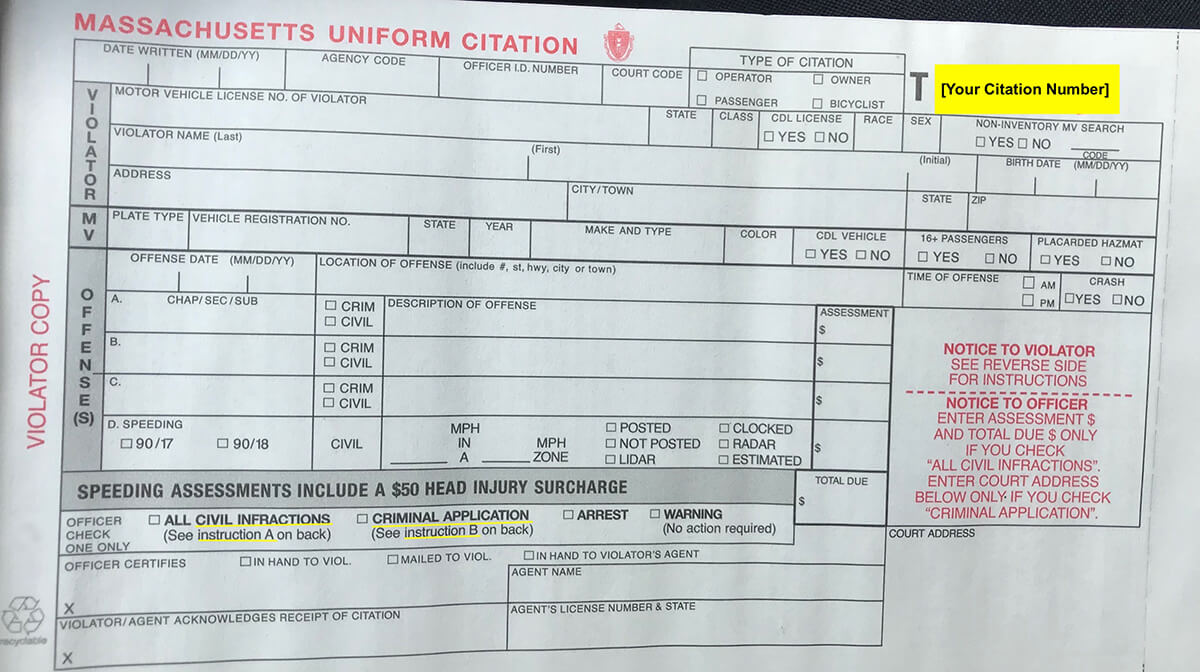What You Need to Know When Deciding Whether to Appeal a Traffic Infraction or Traffic Offense in Massachusetts
As you review the bottom of the ticket where there are 4 boxes, you will quickly see what you are being cited for and whether it is criminal or civil or both. It is very important to understand the time sensitivity of making the decision on whether you wish to appeal the charges.
This article focuses primarily on the difference between “All Civil Infractions” and “Criminal Application” boxes and what to understand to help you make an informed decision about whether to appeal or not.

Is the “All Civil Infractions” Box Checked on the Citation?
When this box is checked, this is nothing more than a civil traffic ticket for which you will receive a monetary fine. The amount of the fine will differ depending in the violation. Some violations have a set amount such as $50, $100, $500 while others such as speeding will vary depending on how fast the police say you were driving. Some common civil motor vehicle violations include:
- Speeding
- Failing to stop (stop sign or red light)
- Marked lanes violation (changing lanes without signaling)
- Improper equipment (tail light or head light not working)
- Passing a stopped school bus
- Texting while driving
- Improper use of a handicap placard
- Expired or invalid inspection sticker
You Should Appeal Civil Traffic Infractions Because it is Not Always Just a Fine
Some people might ask, “If it is just a traffic ticket with a fine, why would I go through the time and expense to appeal it versus just paying the ticket?” Generally, the punishment for most civil traffic tickets is a monetary fine. However, the consequences of being found responsible for a traffic violation are often much further reaching than just a fine. A few of these consequences are detailed below:
- Most traffic infractions are considered moving violations. A moving violation which will subject you to an insurance surcharge and also affect your “points” with the insurance Merit Rating Board (i.e. more points = higher insurance rates). This can apply to traffic violations in Massachusetts and out of state.
- Three speeding tickets (including any outside of Massachusetts) within a 12-month period (any 12 months on a rolling basis – not just a calendar year) will cause your license to be suspended for 30 days and will also result in your having to pay a $100 license reinstatement fee
- Three surchargeable events within a 3-year period can result in a license suspension, unless you complete a National Safety Council driving course within 90 days. If you fail to do this, your license will be suspended until the course is completed
- Seven surchargeable events within a 3-year period will result in a 60-day license suspension
- 12 moving violations within a 5-year period will result in a 4-year license suspension as a Habitual Traffic Offender (HTO)
- Junior Operator License (JOL) holders have severe penalties for even a single moving violation. For example, a single speeding violation can result in a 90-day license suspension, driver re-training course, SCARR course, $500 license reinstatement fee, and full driver road test. Penalties escalate for additional violations. For a second speeding violation the loss of the Junior Operator’s License is 12 months, along with the same fees and courses as required for a first offense. For junior operators, there are also severe penalties for driving during restricted time periods and for violation of passenger restrictions.
- For those who hold a Commercial Driver’s License (CDL) or otherwise drive to make their living, the effect of a responsible finding for even civil motor vehicle infractions on their driving record could result in the loss of their job or denial of employment, depending on the employer and circumstances.
- A responsible finding or conviction for two serious offenses in a 3-year period can result in a loss of your Commercial Driver’s License for 60 days
- A responsible finding or conviction for 3 serious offenses in a 3-year prior can result in a loss of your Commercial Driver’s License for 120 days
- Among other things, a “serious offense” includes:
- Speeding 15 miles per hour or more over the posted speed limit;
- Improper lane changes; and
- Following another vehicle too closely
We recommend that you appeal given the potential implications to your insurance, driving record and employment. Contact Contant Law to help you through this process.
Is the “Criminal Application” Box Checked on the Citation?
When this box is checked, it means that at least one of the traffic violations is a criminal offense. Some common criminal traffic offenses, include:
- Drunk driving (OUI/DUI)
- Reckless operation of a motor vehicle
- Driving to endanger
- Operating an unregistered or uninsured vehicle
- Driving without a license
- Attaching license plates to a different vehicle, just to name a few.
If You Were Not Arrested You Should Always Seek to Appeal a Criminal Traffic Offense
If you were not arrested at the scene you should ALWAYS appeal a ticket for a criminal traffic offense. By submitting this type of appeal, it allows you to have a hearing before a clerk magistrate before any criminal charges are issued. The obvious benefits of winning this type of appeal are that the matter is put to an end and the charges are never issued, which ensures that:
- Your criminal record stays clean
- You would not have to go before a judge
- You would have no penalty, (such as a fine, probation, jail time, etc.) for the offense
- Your legal fees would be significantly less for an appeal to a clerk magistrate than having to defend the charges before a judge in court
It is very important to make a timely and informed decision about appealing a traffic infraction and traffic offense.


